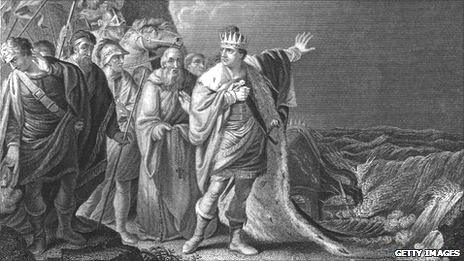Is King Canute misunderstood?
- Published

In the recent row over injunctions and Twitter, the analogy of King Canute vainly holding back the tide has constantly been used. But is it correct?
"Who does he think he is - King Canute?" blasted one newspaper. A prominent media lawyer, Mark Stephens, said that by "trying to stop the unstoppable tide of information as it flows through the internet, [Ryan Giggs] has become the King Canute of football".
John Hemming, the Liberal Democrat MP - who used parliamentary privilege to name the footballer who had applied for an injunction - said of gagging orders: "They are like King Canute, the tide will keep coming in no matter what they do. The problem the courts have is Twitter is not registered in the UK and is therefore outside British jurisdiction."
In all these examples, the sentiment in the same, King Canute is being used as shorthand to describe trying and failing to hold back the tide.
Earlier this year, MP Frank Field warned David Cameron to "stop being King Canute" if he wanted to avoid being "overwhelmed by the incoming tide of local authority cuts".
But was the legendary Viking leader and 11th Century King of England so deluded to really assume he had the powers to turn back the tide?
Almost certainly not. While the histories of the time are unreliable, it seems probable that King Canute was not a madman who thought he could control nature.
The first written account of the Canute episode was in Historia Anglorum (The History of the English People) by chronicler Henry of Huntingdon, who lived within 60 years of the death of Canute (1035 AD).
According to the story, the king had his chair carried down to the shore and ordered the waves not to break upon his land.
When his orders were ignored, he pronounced: "Let all the world know that the power of kings is empty and worthless and there is no King worthy of the name save Him by whose will heaven and earth and sea obey eternal laws," (Historia Anglorum, ed D E Greenway).
The account shows Canute setting out to demonstrate that the tide would come in regardless, says Professor Simon Keynes of the department of Anglo-Saxon, Norse and Celtic at the University of Cambridge.
But most modern-day analogies of Canute turn Henry of Huntingdon's account on its head.
"They are mostly misused in order to illustrate something being swamped like King Canute.
"It is often used about politicians who consider themselves so powerful they can stop the tide of something, such as rising wages - as arrogant as King Canute," says Prof Keynes, who says he used to collect examples from the newspapers of those so-called Canute moments.
"Everyone always gets it wrong. The latest debate is a nice example of how legend becomes distorted when it is told and retold," says Prof Keynes. "Every now and then someone points out that the reference is wrong, but commentators continue to do it and historians such as myself wince."
"The story is intended to illustrate his piety - a prominent feature in his kingship," he says. "He knows his power is nothing besides that of God."
"The subtext is that he knows what is going to happen - he is demonstrating what he knows already."
So while the Canute abusers regard him as a laughing stock - Prof Keynes describes him as a "remarkable king".
"He was a firm ruler, renowned not only for actions calculated to win the support and affection of his English subjects, but also for his attempts at reconciling the English and the Danes.
"Although he had come to rule over the English by force of arms, he dealt intelligently with the situation and always acted with acute political sense."
Of course, no-one knows for sure whether or not the tide event actually happened. Some academics see it simply as a story that has little basis in fact.
"It's a 12th Century legend... and those 12th Century historians were always making up stories about kings from Anglo-Saxon times," says Malcolm Godden, Professor of Anglo-Saxon, Faculty of English, at Oxford University.
"The real Canute - or Cnut - showed no signs of such humility and ruled a vast empire using his military power and a fearsome set of bodyguards.
"There are some signs that he was good at spin, but I can't imagine that he could afford to go around telling his followers that he wasn't as powerful as they thought."